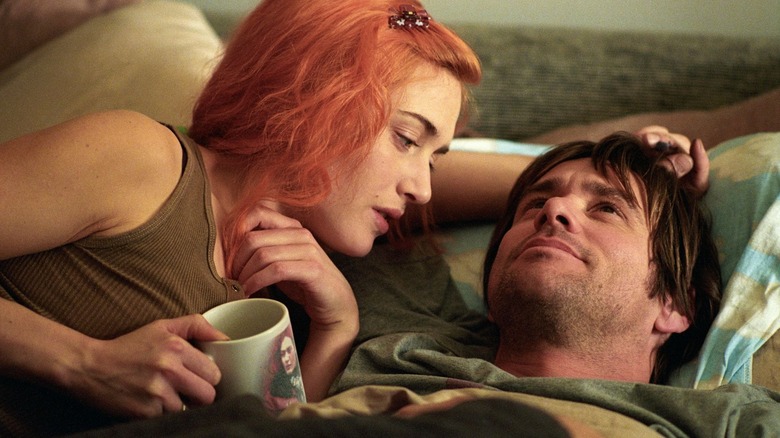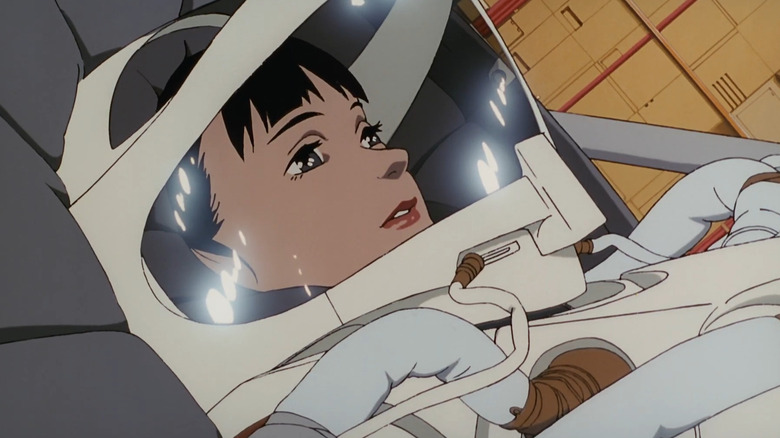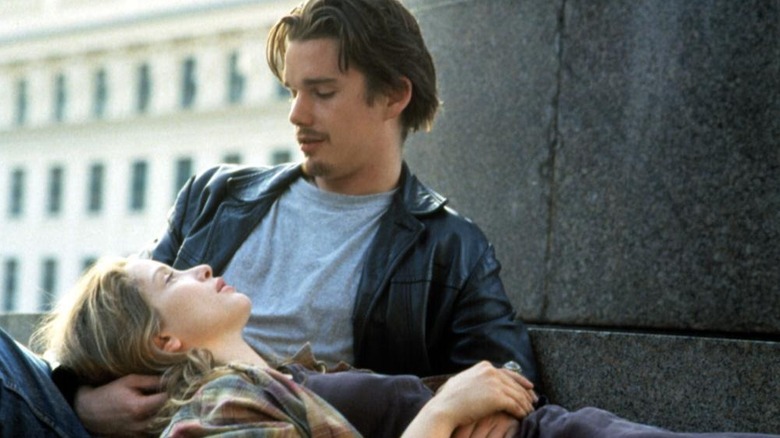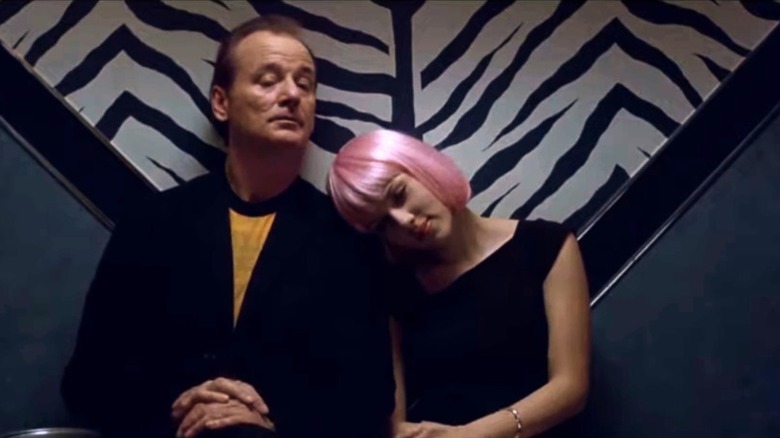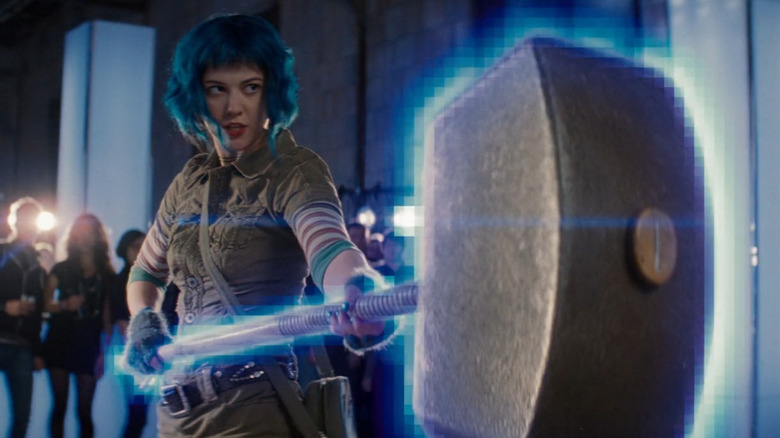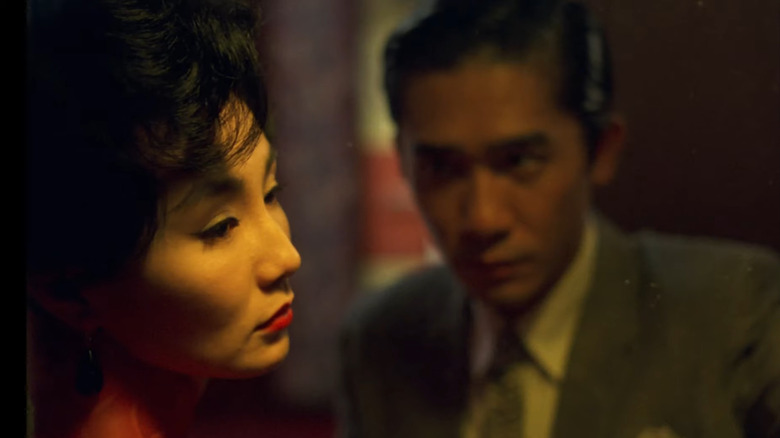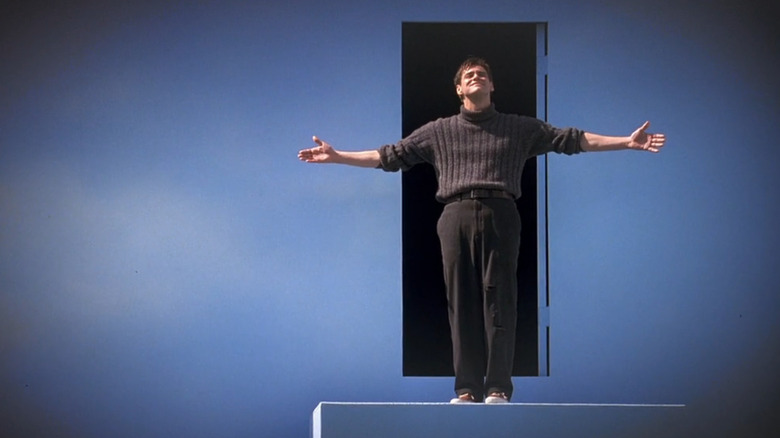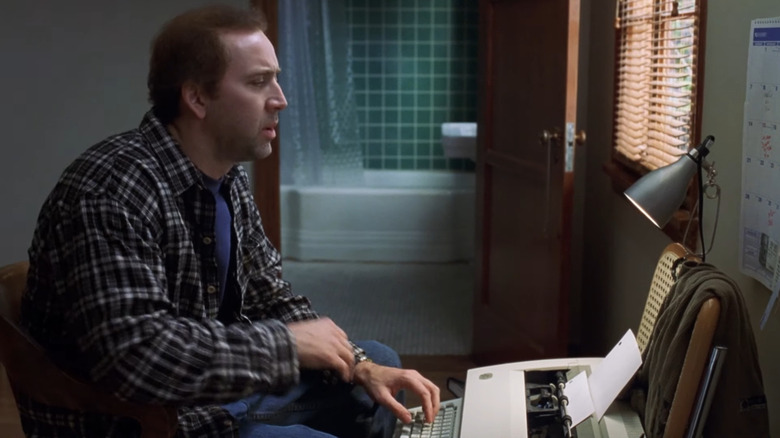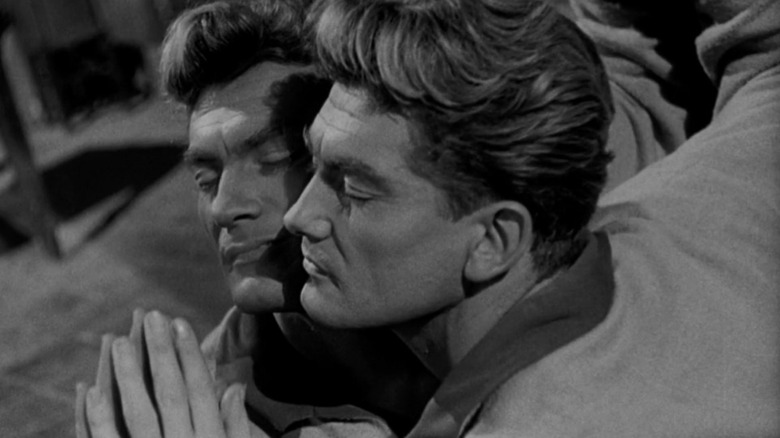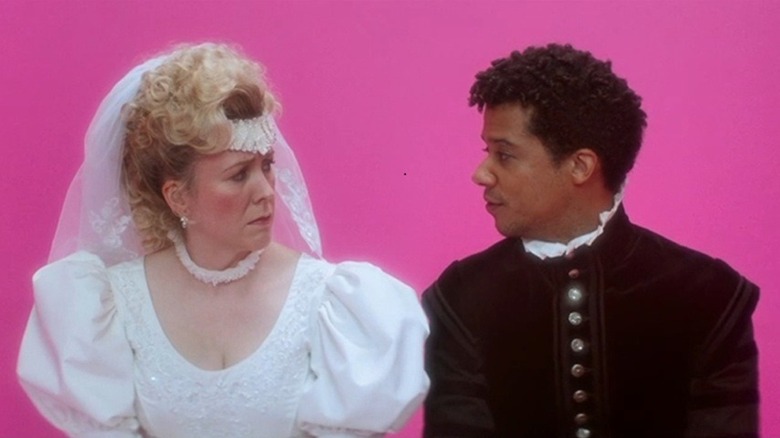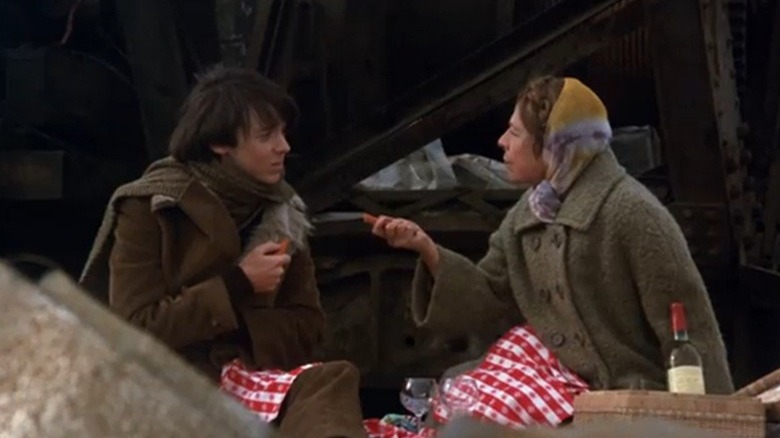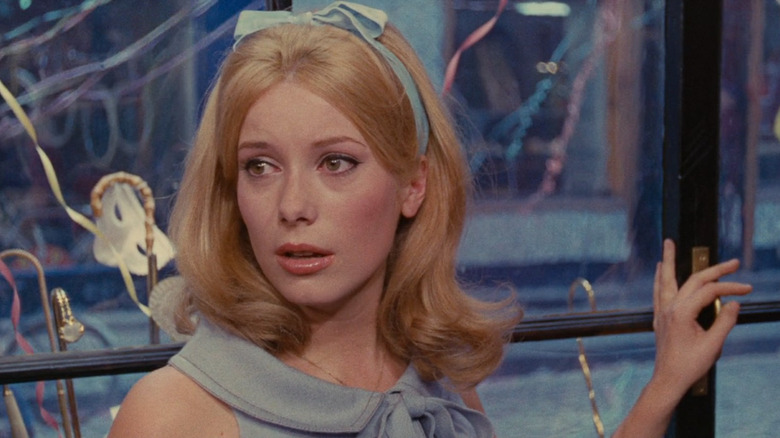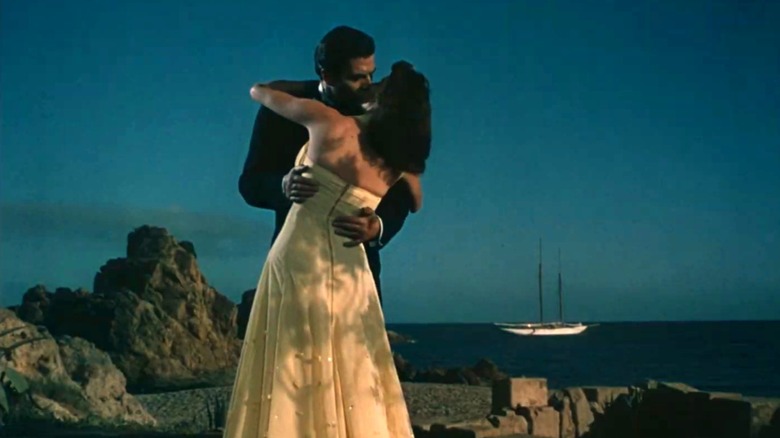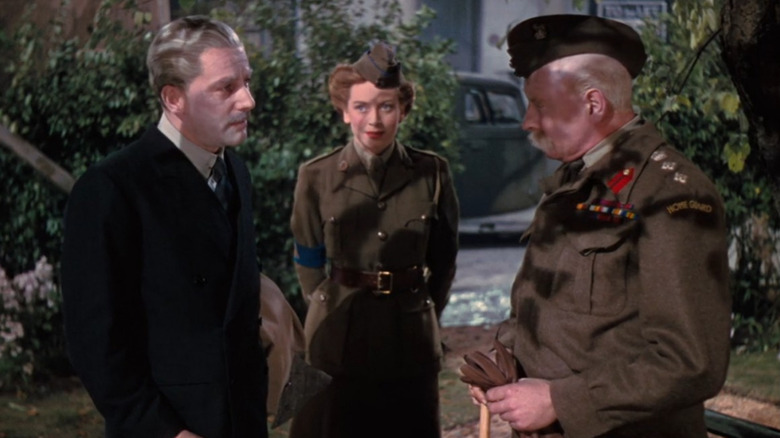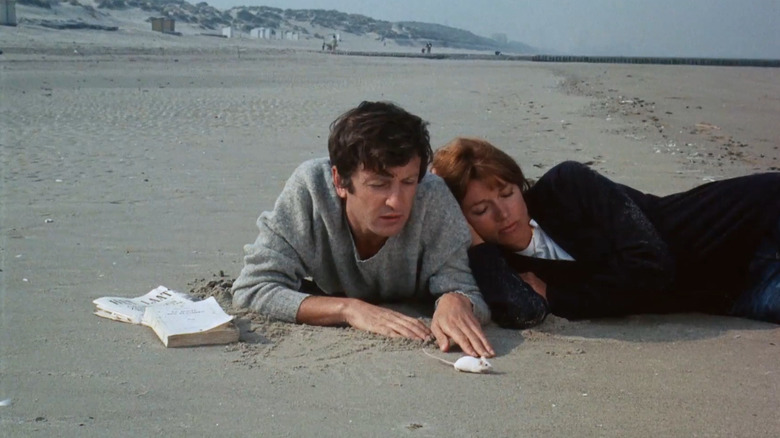15 Best Movies Like Eternal Sunshine Of The Spotless Mind
"Eternal Sunshine of the Spotless Mind" is a movie about two people who, after a catastrophic breakup, undergo a procedure to permanently erase their memories of each other. Interestingly enough, however, this 2004 film about the act of forgetting has proven to be unforgettable.
Written by Charlie Kaufman and directed by Michel Gondry, "Eternal Sunshine of the Spotless Mind" begins with Joel Barish (Jim Carrey, in one of his best performances) waking up with an inexplicable urge to skip work and go to the beach at Montauk in the middle of winter. There, he encounters Clementine Kruczynski (Kate Winslet), a charming and impulsive woman with bright blue hair. This seems like the perfect movie meet-cute, but unbeknownst to both Joel and Clementine, they've already met, loved, and lost each other.
A mesmerizing mix of science fiction and romance, "Eternal Sunshine" utilizes a non-linear structure to explore Joel's fragmented memories and his relationship with Clementine — or at least, the version of Clementine that lives in his head. By turns melancholy and wistful, the film is as likely to spark a viewer's belief in the power of love as it is to crush it. While there is only one "Eternal Sunshine," there are many excellent films that explore similar themes of memory, perception, love, and heartbreak. Here are the 15 best films like "Eternal Sunshine of the Spotless Mind."
Millennium Actress
The wall between fiction and reality crumbles as a retired film star tells the story of her life in "Millennium Actress." The sophomore feature from the late, legendary "Perfect Blue" director Satoshi Kon, the 2001 anime film follows a documentary crew as they interview Chiyoko Fujiwara (Mami Koyama), a famous actress who disappeared suddenly from public life.
The crew learns the secret behind her stardom: When she was a young girl (Fumiko Orikasa), Chiyoko helped a painter and political dissident escape from the police. Vowing to be reunited with her first love, she became an actress in hopes of finding him again.
As Chiyoko recounts her past, her memories begin to blur with the plotlines of her films (including a samurai drama and a kaiju movie), causing the documentary crew to bounce back and forth between the two worlds. This complex plot structure is dizzying but never disorienting, and "Millennium Actress" is a kaleidoscopic exploration of memory and mythmaking.
Before Sunrise
What if the love of a lifetime lasted only a single night? That is the perilous possibility hanging over "Before Sunrise," Richard Linklater's 1995 film about two strangers who fall in love over the course of one long, beautiful evening. Jesse (Ethan Hawke) and Céline (Julie Delpy) meet by chance on a Eurail train; impulsively disembarking in Vienna, they roam the moonlit streets and cafes and talk about life, relationships, and the future. Their feelings deepen into love, but with Jesse flying back to America in the morning, they confront the terrifying truth that they may never see each other again.
Spoiler alert: they do. "Before Sunrise" is one of the few romance films to launch an entire trilogy, with 2004's "Before Sunset" and 2013's "Before Midnight" (all directed by Linklater) following the progression of Jesse and Céline's romance through the decades. Achingly intimate and beautifully acted, "Before Sunrise" was inspired by a real night in Linklater's life, adding to its emotional power.
Lost in Translation
Bill Murray gives a career-defining performance as Bob Harris, a washed-up Hollywood star filming a Japanese whiskey commercial, in writer-director Sofia Coppola's masterful 2003 romantic comedy-drama "Lost in Translation." Scarlett Johansson plays Charlotte, a recent college graduate already withdrawn from her marriage to a celebrity photographer (Giovanni Ribisi). Staying in the same Tokyo hotel, Charlotte and Bob are pulled into each other's orbit and explore the city together. As the two struggle with culture shock and their mutual uncertainties about love and life, their newfound intimacy teeters on the precipice of romance.
An immediate critical and commercial success, "Lost in Translation" has also faced scrutiny for its stereotypical depictions of its Japanese characters. The film won a best original screenplay Academy Award for Coppola, and supplied Murray's sole Oscar nomination for best actor. More than 20 years after its release, "Lost in Translation" still sparks discussion over the enigmatic final scene between Bob and Charlotte, a testament to the film's impact on audiences.
Scott Pilgrim Vs. The World
A lonely, aimless young man meets the exciting, blue-haired woman of his dreams — but if they're going to have any future together, they'll have to fight for it, and confront their complicated pasts in the bargain. Sound familiar? In "Scott Pilgrim Vs. The World," Canadian slacker Scott Pilgrim (Michael Cera) falls for the mysterious delivery girl Ramona Flowers (Mary Elizabeth Winstead). The course of true love never runs smooth, however, and if Scott wants his happy ending with Ramona, he'll need to defeat the league of her seven evil exes in mortal combat.
Fists fly and hearts shatter in this colorfully kinetic 2010 film by director Edgar Wright, based on the generation-defining graphic novels by Bryan Lee O'Malley. Initially a box office bomb (or "bob-omb"), "Scott Pilgrim" has become a cult classic and inspired the 2023 Netflix anime series "Scott Pilgrim Takes Off," with the entire original cast reprising their roles. Featuring stunning video game-inspired visuals and a killer soundtrack, "Scott Pilgrim Vs. The World" is the chaotic, caffeinated cousin to "Eternal Sunshine of the Spotless Mind."
Palm Springs
For some people, a never-ending vacation in Palm Springs, California, would be paradise. For Nyles (Andy Samberg) and Sarah (Cristin Milioti), it's purgatory. The 2020 film "Palm Springs" is a sunny, salty take on the time loop trope, with a mysterious cave vortex swallowing two members of a wedding party and forcing them to relive the same beautiful day over and over.
The time loop offers an eternity of consequence-free partying and pool-hopping, and Nyles and Sarah soon develop feelings for one another. But Nyles, who spent eons alone in the loop before an interrupted tryst accidentally led Sarah to the vortex, has grown complacent with his life in Palm Springs, and is unaware that every morning Sarah wakes up, she relives the worst mistake of her life. When Sarah comes up with a risky plan to escape the loop once and for all, Nyles chooses between living alone in the safety of the loop or taking a leap of faith with the woman he loves.
An existential romcom featuring sparkling performances from Samberg and Milioti, "Palm Springs" is as fun as a unicorn pool floatie and as prickly as a cactus.
In the Mood for Love
Suppressed passions simmer in the shadows in Wong Kar-wai's exquisite 2000 drama "In the Mood for Love." Tony Leung plays Chow Mo-wan, a writer living in 1962 Hong Kong. Chow is drawn to the beautiful woman in the apartment next door, Su Li-zhen (Maggie Cheung); finding themselves often alone at night, they gradually realize that his wife and her husband are locked in an affair. Chow and Su bond over their strange connection, falling hopelessly in love — a love that must remain unconsummated, because neither are able to betray the spouses who betrayed them.
Praised upon release for its powerful lead performances and gorgeously atmospheric cinematography, "In the Mood for Love" is regarded today as a modern masterpiece and one of the best romantic films ever made. Wong continued the story of Chow and Su (again played by Leung and Cheung) in the 2004 sci-fi-tinged sequel "2046," which was also met with critical acclaim.
The Truman Show
"Eternal Sunshine of the Spotless Mind" star Jim Carrey made his breakthrough as a dramatic actor in "The Truman Show," Peter Weir's modern classic about a man literally born to be a television star. Carrey plays Truman Burbank, a cheerfully ordinary man living in the idyllic island town Seahaven. Unfortunately, Truman's picture-perfect life is an elaborate fiction constructed for a reality television show — Seahaven is a gigantic set, his wife Meryl (Laura Linney) is an actress, and every moment of Truman's life is being filmed by hidden cameras.
Bizarre events (like a stage light falling from the "sky") alert Truman to the truth of the world around him, but if he wants to liberate himself from "The Truman Show" he must confront the man controlling him from the shadows, the show's godlike director, Christof (Ed Harris).
Released in 1998, "The Truman Show" was nominated for three Academy Awards. Decades later, its reputation has only grown, with the film's prophetic portrayal of reality television startlingly relevant to 21st century pop culture.
Adaptation
Screenwriter Charlie Kaufman (Nicolas Cage) is struggling to write an adaptation of "The Orchid Thief," a bestselling non-fiction book by Susan Orlean (Meryl Streep). Charlie's outgoing identical twin brother, Donald (also Cage), has just sold a screenplay for a tawdry thriller, frustrating Charlie even more. Charlie may also be falling for Susan, unaware that she is having an affair with her subject: the bizarre, backwater orchid thief John Laroche (Chris Cooper, in an Oscar-winning performance). All of these things are true — but they're also complete fabrications.
"Adaptation" is a brain-breaking 2002 comedy written by "Eternal Sunshine" scribe Charlie Kaufman, who channeled his real-life struggles with Orlean's book into an absurd, metafictional masterpiece. This sly, inventive film breaks apart and reassembles the idea of "adaptation" itself, from the kind found in nature (like the rare orchids Laroche covets), to Charlie's challenge in transforming the book from page to screen.
With his complex, multilayered performances as Charlie and his non-existent brother Donald (to whom the film is still dedicated), it's no wonder that Cage was in consideration to play the lead in Kaufman's follow-up, a little feature film called "Eternal Sunshine of the Spotless Mind."
Orpheus
The ancient Greek myth of Orpheus and Eurydice is re-imagined for the 20th century in Jean Cocteau's haunting and masterful "Orpheus." Filmed in shimmering black-and-white, the 1950 feature film depicts Orpheus (Jean Marais) as a famous French poet married to the intelligent but overlooked Eurydice.
When Orpheus witnesses a younger poet's death in a street brawl, a beautiful princess appears in a Rolls Royce to take the body away. That princess is Death herself, and she soon ensnares Orpheus and Eurydice into a supernatural love triangle that takes all three of them to the depths of the underworld.
Director Cocteau's ingenious use of practical special effects and camera tricks gives "Orpheus" an eerie, dreamlike power. A pair of surgical gloves and a mirror are the only tools needed to enter the underworld, and when a dead character needs to be resurrected, the film simply reverses. As film critic Roger Ebert wrote, "Seeing 'Orpheus' today is like glimpsing a cinematic realm that has passed completely from the scene."
Timestalker
It's 1688, and poor spinster Agnes (Alice Lowe) has fallen in love with the wrong man. It's 1793, and married aristocrat Agnes has fallen in love with the wrong man. It's 1980, and obsessed pop star fan Agnes has — well, you get the idea. "Timestalker," the 2024 reincarnation romcom from director-writer-actor Lowe, follows its lovestruck heroine as she stumbles through the centuries, losing her heart (and, thanks to a few deadly accidents, her head) to the handsome rogue Alex (Aneurin Barnard) in every lifetime. Can Agnes break the toxic cycle and learn to love herself, or is she doomed to make the same mistakes for eternity?
A hilarious, heart-shaped hallucination of a film, "Timestalker" features colorful cats, giant wigs, multiple beheadings, and "Interview with The Vampire" star Jacob Anderson wearing outrageous period costumes as Agnes' mysterious ally, Scipio. Triple-threat Alice Lowe is a force to be reckoned with, and her vital, surprisingly vulnerable performance as Agnes gives "Timestalker" an existential edge.
Harold and Maude
Hollywood has no shortage of movies about cynical young men meeting exciting, free-spirited women who reignite their zest for life — but arguably no movie has done it better than "Harold and Maude," Hal Ashby's 1971 counterculture classic. Harold (Bud Cort) is rich, depressed, and plays gruesome pranks on his socialite mother. Maude (Academy Award winner Ruth Gordon) is a nude model who crashes strangers' funerals and has an irrepressible joie de vivre. Harold and Maude are soulmates — the fact that Maude is 50 years older than Harold is beside the point.
"Harold and Maude" is an outrageously original love story, by turns quirky, bittersweet, and life-affirming. Though it met with mixed reviews upon release, it has been reappraised in recent decades. It's now consistently ranked among the best romantic comedies and cult films ever made — to the extent that, in 1997, "Harold and Maude" was selected by the Library of Congress to be preserved in the National Film Registry among other "culturally, historically or aesthetically significant" films.
The Umbrellas of Cherbourg
A lush, colorful musical from 1964 may seem like an unlikely candidate for one of the most heartbreaking films ever made, but that is the unique power of "The Umbrellas of Cherbourg." In Cherbourg, France, Geneviève (a radiant Catherine Deneuve) works at her mother's small umbrella shop and is passionately in love with Guy (Nino Castelnuovo), a young auto mechanic.
Guy is drafted for the Algerian War, disrupting their idealistic dreams; the night before he leaves, they make love and conceive a daughter. Despite Geneviève and Guy's tender declarations of eternal love, life has different plans for both of them.
Directed by Jacques Demy, "The Umbrellas of Cherbourg" is a remarkable movie musical in that every line of dialogue is sung by the characters. With its operatic passions and dazzling, kaleidoscopic colors, "The Umbrellas of Cherbourg" captures all the beauty and pain of first love, and what comes after it.
Pandora and the Flying Dutchman
"Pandora and the Flying Dutchman" is a sumptuous, surreal romantic fantasy film that presents a love story of epic proportions. Pandora Reynolds (Ava Gardner) is an American nightclub singer in a coastal Spanish town, and her cruel beauty sows nearly as much chaos as her mythical namesake. Surrounded by admirers, Pandora is a reluctant femme fatale, but she meets her match when the mysterious Hendrik van der Zee (James Mason) sails into town on his yacht.
Hendrik is really the Flying Dutchman of legend, a 16th-century captain doomed to sail the seas for eternity until he finds a woman who loves him enough to die for him. Hendrik and Pandora's hearts collide, and their resulting passion threatens to consume not only them, but the unlucky souls around them as well.
Made in 1951, "Pandora and the Flying Dutchman" boasts stunningly vivid Technicolor cinematography from Jack Cardiff, which gives the film a dreamy intensity. Ava Gardner's towering performance as Pandora has since been immortalized; a statue of her stands in Tossa de Mar, the Spanish town where the movie was filmed.
The Life and Death of Colonel Blimp
"War starts at midnight!" shouts the mustachioed, barrel-bellied Major-General Clive Wynn-Candy (Roger Livesey), early in 1945's "The Life and Death of Colonel Blimp." Relaxing in a Turkish bath, Wynne-Candy has just been ambushed by a young squad of British Army officers as part of a training exercise — if the Nazis won't play by the "rules" of war, why should they?
"The Life and Death of Colonel Blimp" uses an ingenious flashback structure to re-introduce Wynne-Candy as an idealistic young veteran of the Boer War. In 1902, Wynne-Candy meets two people who will follow him, in one way or another, for the rest of his life: the German soldier Theo Kretschmar-Schuldorf (Anton Walbrook), and the stunning redhead Edith Hunter (Deborah Kerr, who will play two more surprise roles). Wynne-Candy looks upon his past as an era when wars were fought by gentlemen with honor — a nostalgic notion that, if it was ever true, has certainly died during World War II. Can the Major-General learn his lesson, or is it too late to change?
Roger Livesey is thoroughly convincing as both the dashing young Wynne-Candy and (under a heap of makeup and prosthetics), the old "Colonel Blimp" of the title. Directors Eric Powell and Emeric Pressburger disguise a war film as a comedy of manners, and beneath its light, Technicolor surface is a strong, noble heart. "The Life and Death of Colonel Blimp" is considered to be one of the best British films of all time.
Je t'aime, Je t'aime
The 1968 French film title "Je t'aime, Je t'aime" translates to "I Love You, I Love You," but viewers should not expect a cheerful frolic on the beach. This daring and conceptual science fiction film follows Claude Ridder (Claude Rich), a survivor of a recent suicide attempt, as he enrolls in a bizarre time travel experiment.
The trial goes wrong — instead of Claude going back in time for only one minute as planned, he re-experiences his life in sudden, non-chronological bursts. The experiment forces Claude to confront his relationship with his unhappy girlfriend, Catrine (Olga Georges-Picot), and where he went wrong.
"Je t'aime, Je t'aime" has been compared to "Eternal Sunshine of the Spotless Mind" for its fragmented, abstract editing and its emotionally fragile protagonists. In this strange, cerebral film (where the time machine resembles a giant brain), even the most mundane memories become irretrievably precious.
If you or someone you know is struggling or in crisis, help is available. Call or text 988 or chat 988lifeline.org
